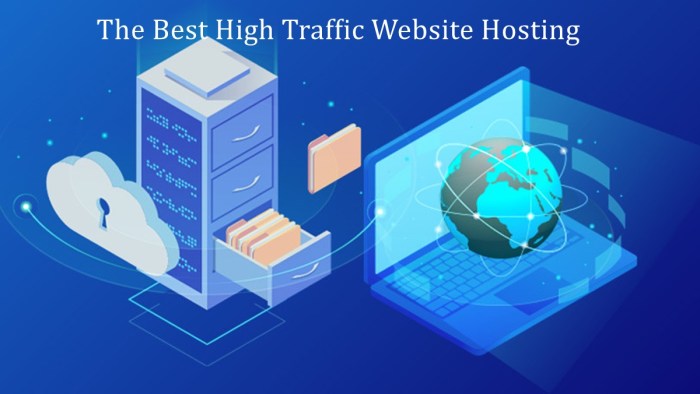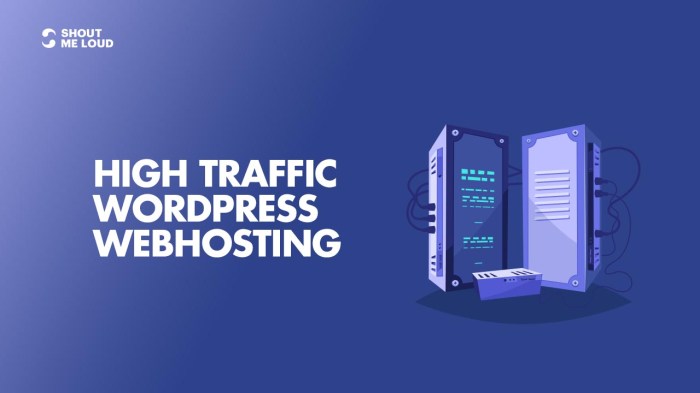Best Web Hosting for High Traffic Websites: What to Look For – navigating the complex world of web hosting for high-traffic websites can feel daunting. With millions of users accessing your website daily, you need a hosting solution that can handle the load without compromising speed or reliability. The right hosting plan is crucial for ensuring a seamless user experience and maximizing your online success.
This guide will explore the essential features and considerations for choosing the best web hosting for high-traffic websites. We’ll delve into key aspects like server resources, scalability, security, and support, providing valuable insights to help you make an informed decision.
Understanding High Traffic Website Needs

Hosting a high-traffic website presents unique challenges that require a robust hosting solution. Unlike websites with moderate traffic, high-traffic websites experience frequent surges in visitors, potentially overwhelming their infrastructure and impacting user experience.
Impact of Traffic Spikes on Website Performance
Traffic spikes, sudden and significant increases in website visitors, can severely affect website performance. This can lead to slow loading times, server errors, and even website downtime.
- Increased Load on Servers: When a website experiences a surge in traffic, its servers are tasked with handling a significantly higher number of requests simultaneously. This increased load can strain server resources, leading to slower response times and potential server overload.
- Resource Exhaustion: High traffic can deplete server resources like CPU, memory, and bandwidth. If the server cannot handle the demand, it can result in slow loading times, website errors, and even downtime.
- Database Bottlenecks: High-traffic websites often rely on databases to store and manage vast amounts of data. During traffic spikes, the database can become a bottleneck, slowing down data retrieval and processing, further impacting website performance.
Website Features Demanding High-Performance Hosting
Several website features inherently demand high-performance hosting to ensure smooth operation and user satisfaction.
- E-commerce Platforms: E-commerce websites rely on secure payment processing, real-time inventory updates, and fast product loading times. These features require robust hosting infrastructure to handle the high traffic associated with online transactions.
- Streaming Services: Streaming services, like video-on-demand platforms, need high bandwidth and processing power to deliver uninterrupted, high-quality streaming experiences to users. High-performance hosting ensures smooth video playback without buffering or interruptions.
- Interactive Applications: Websites with interactive features like online games, live chat, or real-time data visualization require responsive servers to handle user interactions and data processing effectively. High-performance hosting guarantees a seamless user experience.
- Content Management Systems (CMS): Popular CMS platforms like WordPress, Drupal, and Joomla are often used for high-traffic websites. These platforms require robust hosting solutions to manage large databases, complex themes, and numerous plugins, ensuring efficient website operation.
Essential Hosting Features for High Traffic
Hosting a high-traffic website demands more than just a basic web hosting plan. To ensure smooth operation and optimal performance, you need a hosting solution that can handle the demands of a large number of visitors. This requires a combination of powerful hardware, robust software, and advanced features designed for high-traffic environments.
Server Resources
Server resources play a crucial role in website performance, especially under high traffic loads. The amount of CPU, RAM, and storage available directly impacts how efficiently your website can handle user requests.
- CPU: The Central Processing Unit (CPU) is the brain of your server. It’s responsible for executing website code and processing user requests. A high-traffic website requires a powerful CPU to handle the increased workload and ensure quick response times. For example, a website with a large number of visitors might require a CPU with multiple cores and high clock speeds to handle the simultaneous processing of requests.
- RAM: Random Access Memory (RAM) is the temporary storage space used by your server to hold data that’s actively being accessed. When a user visits your website, the server loads the necessary data into RAM for quick retrieval. Websites with high traffic require ample RAM to prevent performance bottlenecks and ensure a smooth user experience. For instance, a website with a large number of users accessing dynamic content might require a significant amount of RAM to store the data and code for those pages.
- Storage: Storage space is where your website files are stored. This includes everything from your website’s code and images to user-generated content. A high-traffic website requires sufficient storage to accommodate the volume of data and files. For example, a website with a large database or a lot of media content will need more storage space than a simple website with only a few pages.
Caching Mechanisms
Caching is a crucial technique for improving website speed and reducing server load. Caching mechanisms store copies of frequently accessed data, such as website pages or images, in a temporary location. When a user requests that data, the server retrieves it from the cache instead of processing it again, resulting in faster loading times.
- Page Caching: Page caching stores entire website pages in the cache. When a user requests a cached page, the server delivers the cached version instead of rendering the page from scratch. This significantly reduces the server’s workload and speeds up page loading. For example, a blog post that receives a lot of traffic can be cached to ensure it loads quickly for all visitors.
- Object Caching: Object caching stores individual website elements, such as images, scripts, or stylesheets, in the cache. This allows the server to deliver these elements from the cache, reducing the number of requests to the server and improving overall page loading speed. For example, a website with many images can benefit from object caching, as the images can be served from the cache, reducing the load on the server and improving page loading times.
Scalability and Reliability: Best Web Hosting For High Traffic Websites: What To Look For
For high-traffic websites, it’s not enough to simply have a website that works. You need a website that can handle spikes in traffic without crashing and that is always available to your visitors. This is where scalability and reliability come into play.
Scalability refers to a hosting provider’s ability to adjust resources, such as server power and storage space, to accommodate changing traffic demands. Reliability refers to the hosting provider’s ability to keep your website online and accessible at all times. A reliable hosting provider will have a high uptime percentage, meaning your website is available to visitors for a significant portion of the time.
Understanding Scalability
Scalability is crucial for high-traffic websites because traffic can fluctuate significantly. During peak hours or promotional events, your website may experience a surge in visitors. If your hosting provider doesn’t have the capacity to handle this increased traffic, your website may slow down or even crash. This can lead to a loss of revenue and damage to your brand reputation.
Ensuring Website Uptime and Reliability
Hosting providers employ various strategies to ensure website uptime and reliability:
- Redundant Servers: This means having multiple servers that can take over if one fails. This ensures that your website remains online even if one server experiences an issue.
- Regular Maintenance and Updates: Hosting providers regularly update their servers and software to patch security vulnerabilities and improve performance. This helps prevent downtime caused by security breaches or software bugs.
- Disaster Recovery Plans: These plans Artikel how to restore your website in case of a disaster, such as a natural disaster or a major hardware failure. This helps minimize downtime and ensures that your website can be restored quickly.
- Monitoring and Support: Hosting providers monitor their servers 24/7 to identify and resolve any issues quickly. They also provide customer support to assist with any problems you may encounter.
Hosting Solutions Compared: Scalability and Reliability, Best Web Hosting for High Traffic Websites: What to Look For
| Hosting Solution | Scalability | Reliability |
|---|---|---|
| Shared Hosting | Limited | Moderate |
| VPS Hosting | Moderate | High |
| Dedicated Server | High | Very High |
| Cloud Hosting | Very High | Very High |
Security Considerations

For high-traffic websites, security is paramount. A breach can lead to financial losses, reputational damage, and even legal repercussions. Choosing a hosting provider with robust security features is crucial to protect your website and your visitors.
Common Security Threats and Hosting Provider Solutions
Hosting providers are well-aware of the threats that websites face. They implement a range of measures to mitigate these risks.
- Malware and Viruses: Hosting providers regularly scan servers for malware and viruses, ensuring that your website is not compromised. They may also offer tools to help you detect and remove malware from your website.
- SQL Injection: This attack exploits vulnerabilities in web applications to gain unauthorized access to databases. Hosting providers often use firewalls and intrusion detection systems to prevent such attacks. They may also provide security updates for your website’s software.
- Cross-Site Scripting (XSS): This attack allows malicious scripts to be injected into websites, potentially stealing user data or compromising the site’s integrity. Hosting providers may offer security solutions that scan for and prevent XSS attacks.
- Denial-of-Service (DoS) Attacks: These attacks attempt to overload a website with traffic, making it inaccessible to legitimate users. Hosting providers often have DDoS protection mechanisms in place to absorb and filter malicious traffic, ensuring that your website remains online.
The Role of Firewalls, DDoS Protection, and SSL Certificates
- Firewalls: Firewalls act as a barrier between your website and the outside world, blocking unauthorized access and malicious traffic. They analyze incoming and outgoing network traffic, filtering out potentially harmful requests. Hosting providers often offer firewall services as part of their security packages.
- DDoS Protection: Distributed Denial-of-Service (DDoS) attacks can overwhelm a website with traffic from multiple sources, making it unavailable. Hosting providers often have DDoS protection mechanisms in place, using specialized hardware and software to identify and filter malicious traffic, ensuring that your website remains online.
- SSL Certificates: Secure Sockets Layer (SSL) certificates encrypt the communication between your website and visitors, protecting sensitive information like credit card details and personal data. Hosting providers often offer SSL certificates as part of their hosting packages, ensuring that your website is secure for transactions and user interactions.
Support and Customer Service
When you’re running a high-traffic website, downtime is not an option. You need a hosting provider that offers responsive and knowledgeable support to ensure your website remains online and functioning smoothly.
A reliable hosting provider will have a dedicated support team available to assist you with any technical issues that arise. They should offer multiple support channels, such as live chat, phone support, email, and a comprehensive knowledge base, making it easy for you to get the help you need when you need it.
Types of Support Channels
Hosting providers offer various support channels to cater to different user preferences and needs.
- Live Chat: This is a quick and convenient way to get immediate assistance. You can ask questions and receive real-time responses from a support agent.
- Phone Support: Some hosting providers offer phone support for more complex issues or when a personal touch is preferred.
- Email Support: This is a good option for non-urgent inquiries or when you need a detailed explanation of a problem.
- Ticket System: A ticket system allows you to submit a detailed description of your issue and track its progress.
- Knowledge Base: A comprehensive knowledge base is a valuable resource that provides answers to common questions and troubleshooting guides.
Support Offerings and Customer Service Comparison
When choosing a hosting provider, it’s important to consider the level of support they offer and their reputation for customer service. Here’s a table comparing different hosting providers based on their support offerings and customer service:
| Hosting Provider | Live Chat | Phone Support | Email Support | Ticket System | Knowledge Base | Customer Service Rating |
|---|---|---|---|---|---|---|
| HostGator | Yes | Yes | Yes | Yes | Yes | 4.5/5 |
| Bluehost | Yes | Yes | Yes | Yes | Yes | 4.0/5 |
| GoDaddy | Yes | Yes | Yes | Yes | Yes | 3.5/5 |
| SiteGround | Yes | Yes | Yes | Yes | Yes | 4.8/5 |
| DreamHost | Yes | No | Yes | Yes | Yes | 4.2/5 |
These ratings are based on customer reviews and feedback. It’s important to research different hosting providers and compare their support offerings to find the best fit for your needs.
Choosing the Right Hosting Provider

Choosing the right web hosting provider is crucial for the success of any high-traffic website. A reliable and scalable hosting solution can ensure your website performs optimally, even under heavy load. Here’s a comprehensive guide to help you navigate the selection process.
Evaluating Hosting Providers
Evaluating different hosting providers involves a systematic approach. Here’s a step-by-step guide to ensure you make an informed decision:
- Define Your Website’s Needs: Before you start comparing providers, understand your website’s specific requirements. Consider factors like expected traffic volume, resource demands (CPU, RAM, storage), and any specific features or functionalities you need.
- Research and Compare: Once you have a clear understanding of your needs, research reputable hosting providers that cater to high-traffic websites. Look at their websites, read customer reviews, and compare their hosting plans and features.
- Check for Transparency: Pay attention to the provider’s transparency. Are they clear about their pricing, terms of service, and support options? Do they offer clear service level agreements (SLAs) outlining performance guarantees and uptime commitments?
- Consider Scalability: Ensure the hosting provider offers flexible scaling options to accommodate future growth. Can you easily upgrade your plan as your website’s traffic increases? Do they provide automated scaling solutions?
- Test and Evaluate: If possible, consider using a trial period or a free trial account to test the provider’s performance and support responsiveness. This allows you to experience their services firsthand before committing to a long-term contract.
Key Metrics for Comparison
When comparing hosting plans from different providers, focus on these key metrics:
| Metric | Description |
|---|---|
| Uptime Guarantee | Percentage of time the server is online and accessible. Look for providers with a 99.9% or higher uptime guarantee. |
| Server Resources | CPU, RAM, storage space allocated to your website. Choose a plan with sufficient resources to handle your website’s traffic and demands. |
| Bandwidth | Amount of data transfer allowed per month. Ensure your plan provides enough bandwidth to accommodate your website’s traffic volume. |
| Security Features | Firewall, malware protection, SSL certificates, and other security measures. Prioritize providers with robust security features to safeguard your website and user data. |
| Customer Support | Availability, responsiveness, and quality of support channels (live chat, email, phone). Choose a provider with responsive and knowledgeable support staff. |
| Pricing and Value | Compare the cost of different plans and features offered. Look for providers that offer competitive pricing and value for money. |
Choosing the best web hosting for your high-traffic website is a strategic decision that can significantly impact your online presence and business outcomes. By understanding your specific needs, evaluating hosting options carefully, and prioritizing key features like scalability, reliability, and security, you can find a solution that empowers your website to thrive and reach its full potential.
FAQ Explained
What are some common hosting solutions for high-traffic websites?
Common hosting solutions for high-traffic websites include dedicated servers, VPS hosting, and cloud hosting. Each offers different levels of resources, scalability, and control, catering to specific needs and budgets.
How can I determine the right hosting plan for my website’s traffic volume?
To determine the right hosting plan, consider your website’s current traffic volume, projected growth, and resource requirements. Contact hosting providers for expert guidance on selecting a plan that aligns with your specific needs.
What are the benefits of using a Content Delivery Network (CDN) for high-traffic websites?
CDNs distribute website content across multiple servers globally, reducing latency and improving loading speeds for users worldwide. This is particularly beneficial for high-traffic websites with a global audience.